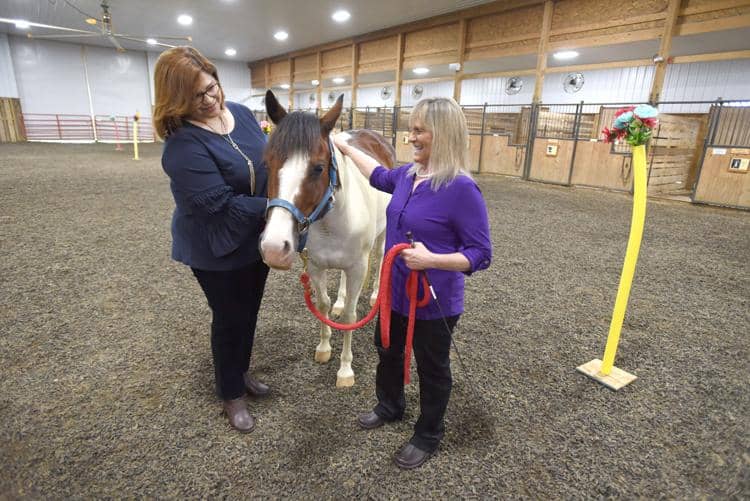
Wanda Figueroa, president & CEO at RiverValley Behavioral Health, left, is shown Stella, a therapy horse, by Sandy Webster on Friday at Dream Riders of Kentucky. Photo by Alan Warren, Messenger-Inquirer | [email protected]
This article is from the Messenger-Inquirer. See the original post here.
Dream Riders of Kentucky has partnered with RiverValley Behavioral Health to expand the nonprofit’s animal assisted therapy.
RVBH will now provide equine assisted therapy as part of its animal assisted therapy program.
The nonprofit already has two therapy dogs — Daisy and River. The dogs are used regularly throughout therapy sessions, according to CEO Dr. Wanda Figueroa.
She said providing animal assisted therapy for patients is a way to help children learn and interact in a non-judgmental environment.
“I think this is a wonderful partnership with RiverValley and Dream Riders,” she said. “Adding the equine therapy by a provider that we trust so much and establishing that partnership is wonderful. I think this is a great resource for our patients and also for the area.”
Sandy Webster, Dream Riders master instructor and equine specialist in mental health and learning, said equine assisted therapy utilizes the herd dynamics and expressive nature of horses to help students learn social behavior and how to interact.
“Horses have what we call exceptional emotional intelligence, so cognitively, they may not be … as intelligent and problem solving … they respond through their senses and because they’re prey animals, they run away from danger,” Webster said. “They approach you if they feel safe and they will not approach you if they don’t, so it’s used in managing your impulsivity or letting go of your anger.”
Figueroa said working with horses and other animals in such a manner, especially those who have been exposed to trauma, have aggressive behaviors or tend to isolate, can benefit by working with horses and interacting in a non-judgmental way that allows them to open up.
Animal assisted therapy also helps patients to modify their behaviors to encourage the horses to respond in a desired way, as well as helping patients learn how to handle frustration when the animal responds differently than what is desired.
It teaches patients how to compromise, she said.
Webster said equine assisted therapy helps build self-confidence for students to utilize outside of therapy and riding.
“We want to give hope, and I think a lot of the people that are coming … they come to our facility with all kinds of issues and problems,” but when they come here, there are all these opportunities for “aha moments” … and that’s a huge step,” she said. “When they’re able to really feel good about something they do, that is a glimmer of hope and that glimmer of hope opens up doors.”
Figueroa said the equine assisted therapy is an opportunity for patients to be welcomed and included.
“For every family and every person that has come to places like this, they have been told no so many times … and to come to a place that is welcoming and includes them, it makes such a huge difference,” she said. “It builds self-confidence.”
Published on June 10, 2021
